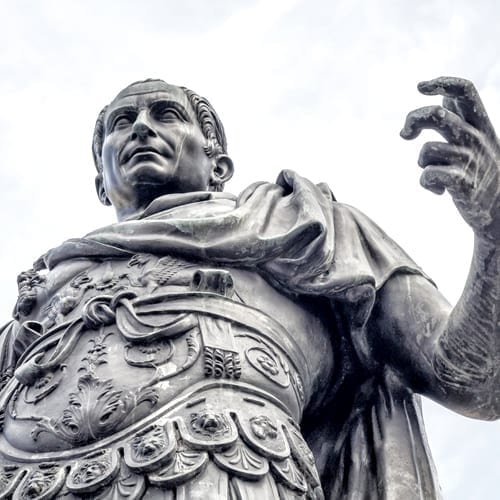
Any cannabis-advocate worth their salt knows that the history of cannabis goes far beyond the hippy culture of the 1960s. Our favorite plant has been used in numerous cultures for various medical and agricultural reasons since as early as 6000 BCE. Though the history of things is a little smokey, small pieces of information and works of art hint at the truth. Not as early as 6000 BCE but near but around 48 BC, wars and alliances between Egypt, Greece, and Rome may have introduced a couple of historical figures to the benefits of cannabis.
So this Thursday, we’re celebrating a well-known figure who may have had a pretty strong relationship with cannabis during that time. After all, he does have a strain named after him. Gaius Julius Caesar is known as one of history’s greatest generals during his key rule of the Roman Empire, but; when he aided in the civil war between the Ptolemy siblings in Egypt, he may have been introduced to cannabis in a whole new light. During the course of events, Caesar may have indirectly been responsible for spreading the plant’s influence as well.
Depending on what calendar you count by, today we would be celebrating Julius Caesar’s 2111 birthday. Many know of him merely because of his famous death but he was praised as a possibly the greatest military minds in history. He expanded the Roman Republic through a series of battles across Europe. Though he is known for his political and military ventures, any cannabis use may come around during his equally famous romance with Greek-Egyptian ruler Cleopatra VII. The cannabis history of both of Cleopatra’s ruling land is what makes the story seem like more than just an high-thought. Also considering Caesar spent nearly two years there, some traditions may have stuck with him.
Cleopatra’s family, the Ptolemys, ruled over Egypt during the Hellenistic Age as Greek culture moved in, but cannabis use dates back to Ancient Egypt before Greek influence. Ancient Egyptian gods were often times adorned in the hemp leaf and worshippers would often use the material in some form during religious festivals and rituals. Both Seshat and Bastet were often depicted with the plant but attributing to different uses depending on the pairing varying from healing to witchcraft. In addition to being used during worship, cannabis was used in the production of ropes, sailes, and fabric. Research suggests that ancient workers used a meticulous technique with the cannabis fiber to break down larger rocks before transporting them to constructions sites. The technique generally involved hammering down the dry cannabis fiber into the cracks of the larger rocks, before soaking them thoroughly in water. As the fabric began to expand it was strong enough to fracture the giant rocks.
Egyptians used cannabis medicinally, as cited in The Ebers Papyrus. The papyrus was written around 1500 BC and is one of the oldest finished medical texts to be found. Inside, one can find various formulas using hemp to alleviate pain and inflammation of different types. Some ancient rulers have even been found to have traces of cannabis in their remains.
Cannabis had been literally woven into the Egyptian way of life in one of the most fluid ways possible. It was used in day-to-day activities as an alternative and beneficial resource. As the Ptolemaic era came to be, however, some of the more ancient traditions were cast aside. Cleopatra VII is one of the only Hellenistic rulers to adopt some Ancient Egyptian traditions and learn ancient text while in power. She even used hemp seed oil to moisturize her skin in the desert air, an ancient ritual.
In Rome, on the other hand, the plant wasn’t used as commonly. The largest empires of the world had a lot of influence in areas where it was used but some didn’t partake. During the Roman Empire, opium was used more commonly though hemp was cited strictly for its medicinal and textile use. Cannabis consumption just wasn’t as big as opium for some odd reason.
Caesar crossed paths with Egyptian culture and Cleopatra in 48 B.C. The young ruler actually was rolled in a carpet to sneak into an audience with Caesar. Apparently, Caesar was entranced by Cleopatra and her divine nature. She likened herself to a goddess and was known for her theatrics aiming as such. Caesar eventually brought Cleopatra and their son, Caesarion, to Rome where more than her style was being adopted, despite criticism.
Cleopatra’s influence over Caesar could have made him more inviting of Egyptian traditions. As mentioned, Egyptians, who Cleopatra attempted to emulate to appease her people, widely used cannabis for a variety of reasons. Her liking herself to goddesses, even adorning herself in hemp leaves and using hemp seed oil might have rubbed off on him. Caesar was a military man and a politician. Cannabis in many forms could’ve been a useful tool in aiding pain relief and relaxation for the decorated statesman.
After Caesar’s untimely death in 44 BC, cannabis began to be explored for its uses. The next hundred years saw more Roman openness to the plant and more research on what it could do. After Caesar and Cleopatra’s affair, more uses for cannabis spread across the area expanding options in parts of the Middle East and Asia who had used the plant as well. In an odd way, Caesar’s relationship to the Greek-Egyptian opened his culture up to a new way of using cannabis. Though it wasn’t as strongly embraced in Rome, it still bled into surrounding areas and raised cannabis’ influence around the world.
If anything, Cleopatra VII was Gaius Julius Caesar’s cannabis mentor. The rich culture that openly used the plant in everyday life was adopted by Cleopatra who wanted to connect with her people. As Caesar allianced himself with her, it’s extremely possible she introduced cannabis and/or hemp use to him in some form. Surrounding areas seem to adopt cannabis more as Roman influence left, leading some to believe it may have been introduced to his soldiers as well while in Egypt. Considering the Roman Military had strict rules it’s members had to adhere to, there’s no way of really knowing. Numerous forum threads have tossed the idea back and forth for years with no clear answer as well. Maybe it is one of the obscure reasons Caesar has a strain named after him. The industry is full of unintentional advocates and he may be just that.
So, Happy Birthday to Gaius Julius Caesar; roll up some of this Hybrid powerhouse and revisit the general’s historic journey.
Written by: Joycelin Arnold





